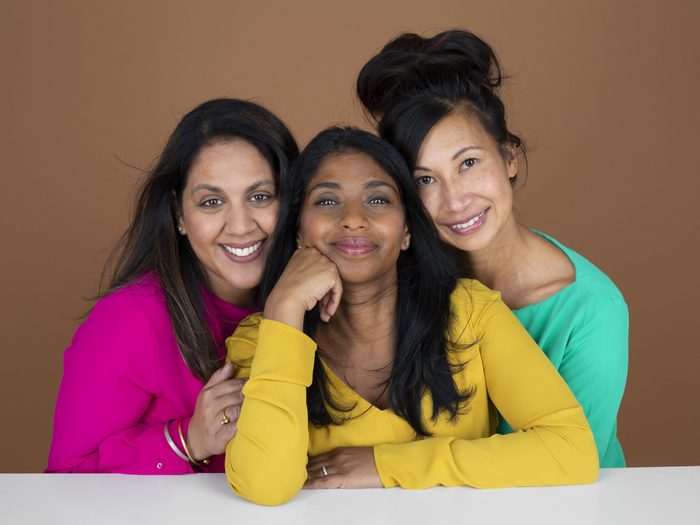
The importance of friendships
Friendships are, quite literally, life-saving. Studies show that people with strong social relationships increase their odds of survival by 50 percent. And the results hold regardless of the person’s age, gender, health status and cause of death. Study after study shows that social connectivity not only generates emotional well-being, it has real physical benefits, too: it boosts our immune and cardiovascular systems, lowers the risk of depression and dementia, and improves our stress responses and the quality of our sleep.
These are across-the-board benefits; they don’t discriminate based on the sort of friendship you have. And friendship can look very different — it might have developed in childhood or in an office cubicle; it can last generations or cross generations; it can be kept all in the family.
We teamed up with photographer Natalia Dolan, who founded The Girl Friends Project in 2018, to share seven friendship stories. “In our society, we prioritize a big message to young girls that finding a romantic soulmate is the end goal,” she says. “But I believe we should be instilling in their minds the seeking and offering of a supportive friendship as the first focus. With my friends, I’m accepted and celebrated—no matter my mistakes, shortcomings and life choices. There is so much love in friendships, and people forget that. I wanted to create a project to remind them.”
Good friends are the antidote to the stresses of daily life, and the pandemic has made these relationships feel more important than ever. They deserve our attention and special care. After all, we get by with (more than) a little help from our friends.
(Related: 9 Ways to Make Friends as an Adult)
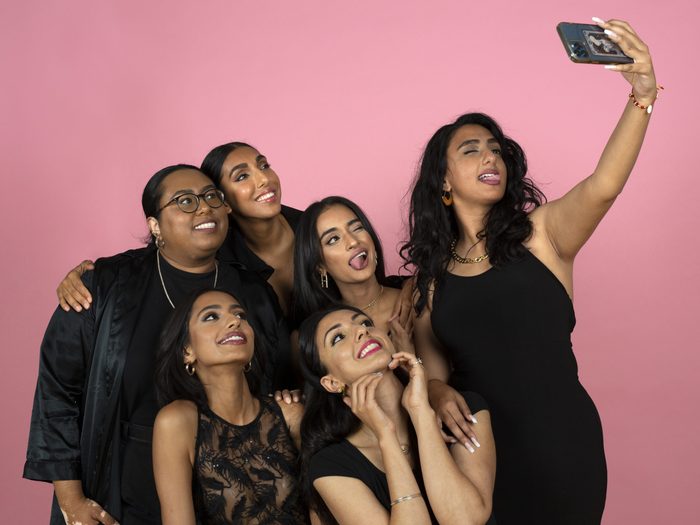
The social network
In 2013, when visual artist Kiran Rai was a teenager living in Brampton, Ont., she became involved with an organization that created arts and cultural events for youth, by youth. It was there she met Baljit Singh, Gagan Bassi, Rupi Kaur, Bali Bassi and Keerat Kaur, who are now her closest friends.
“It was such a boys’ club, and I was sick and tired of it,” says Rai. “Any time I saw a girl who was even remotely interested in creative stuff, I would push them.” Each of Rai’s besties, who all have their own creative endeavours now, can remember a moment when Rai encouraged them to move beyond their comfort zone. “[Rai] sees versions of other people that they haven’t even stepped into yet,” says artist and architect Keerat Kaur.
Before poet Rupi Kaur was topping bestseller lists, having her work translated into 25 languages and starring in an Amazon Prime special, her biggest fans and supporters were these friends. Milk and Honey, the collection of poetry she self-published in 2014, was the groups’ first major collaboration together. They all hawked copies at events, and Gagan Bassi stocked them at her clothing store.
These days, the friends are separated by busy schedules, so they’ve migrated to chatting on FaceTime for hours on end about everything from family drama to upcoming projects.
(Related: Going the Distance: How Covid Has Remapped Friendships)
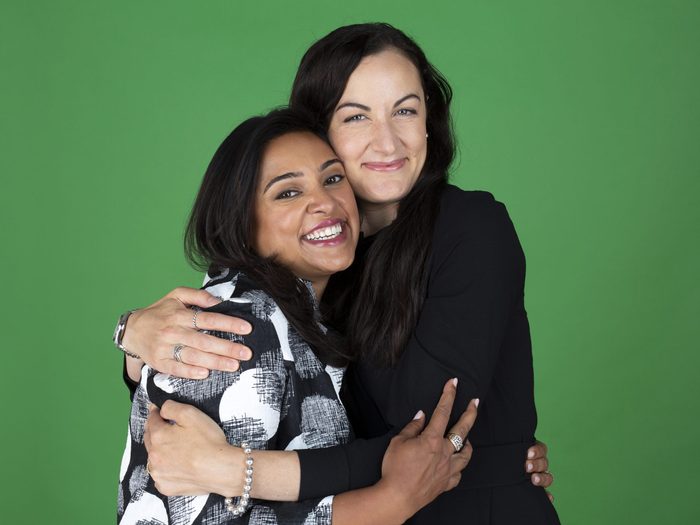
Always on call
When COVID-19 arrived in Canada, Shalu Bains, the Vice President of performance and business intelligence at Trillium Health Partners (which owns several hospitals in Mississauga, Ont.), knew her team needed to be well-informed. She reached out to Laura Rosella, an epidemiologist and the chair of Trillium’s research institute, for help.
In the early months of the pandemic, Rosella and Bains met online every day (including weekends) to look at the daily COVID models and try to figure out what Trillium’s hospitals could expect. They quickly learned how much they had in common: They were both mothers and working professionals, both valued family and, most importantly, shared a passion for the human side of statistics. “Each of those numbers are people, and when speaking to Laura about it, it felt like a work conversation, but we were actually talking about how we see the world,” says Bains. Their work calls soon became late-night texts in which they confided in each other: “None of my friends were on the other side. They weren’t seeing people in the hospitals,” says Rosella.
When the two finally met for the first time (sans screens), it was pure serendipity—they bumped into each other at the same vaccine clinic as they were both receiving their second doses. “You know when things happen in the universe you can’t explain?” says Rosella. “I’m not a superstitious person, but so many things had to go right. Like, one more stoplight and that wouldn’t have happened.”
(Related: Lessons From The Pandemic: How I Learned to Prepare For The Unknown)
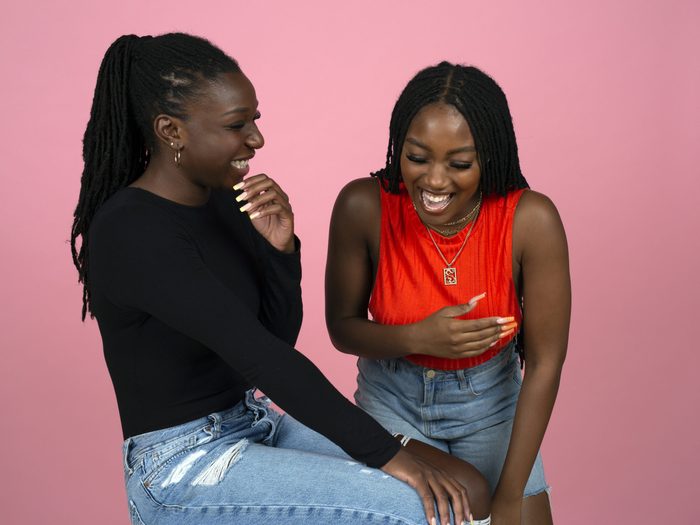
Bestie goals
When Chante Smith moved to Alliston, Ont., in the eighth grade, she immediately knew she’d be best friends with Deanne Rose. “I just felt a connection right away,” Smith says.
Since then, Rose and Smith have been constants in each other’s lives, even as miles separate them. Rose, who plays for the Olympic gold–winning Canadian women’s soccer team, credits Smith as a huge source of support. “Having someone in your life that you can call for whatever situation is so underrated,” she says. “When the Olympics were cancelled, I could rely on Chante as an outlet—we didn’t have to talk about any of it.” For her part, Smith says that when Rose won the gold medal in Tokyo, she felt like she had won, too.
(Related: 5 Olympian-Worthy Coping Strategies to Use During the Pandemic)
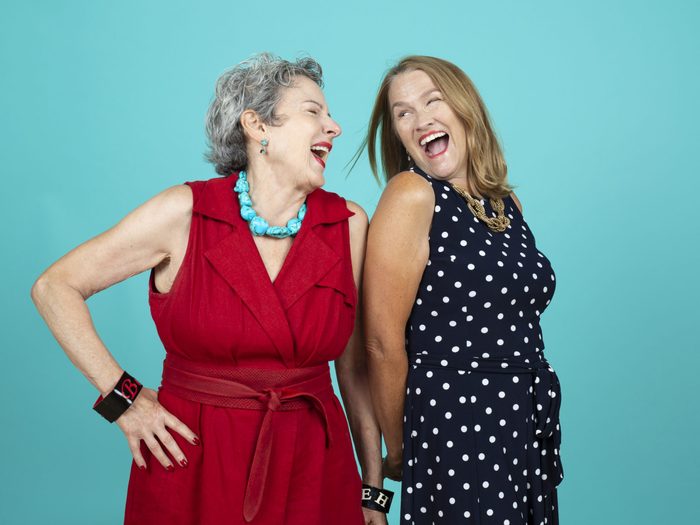
Golden girls
When Geri Rockstein met Sue Foster in Montreal in the ’70s, they bonded over their mutual love of fashion, fitness and sushi. Eventually, they both settled in Toronto and supported each other through breakups, cross-country moves and the death of loved ones. Over the years, their friendship deepened into something closer to sisterhood.
In 2018, Rockstein suffered a stroke. Doctors said she only had a one in four chance of fully recovering. “When I first woke up from a coma, I could barely speak. In fact, I could only say three words: yes, no and fuck. Sue was by my side the whole way. She was my lifeline.” Stepping into the role of caregiver wasn’t something Foster was conscious of doing at the time. “We’ve been close for so many years, we knew each other so well, that was just what I did,” she says. “I didn’t think twice about it.”
Rockstein says Foster’s care meant everything. She has since made a full recovery, and the two continue to go out for sushi at least once a week and take long walks around the city to stay active and connected.
(Related: How to Keep Your ‘Big Friendships’ Alive, Especially During a Pandemic)
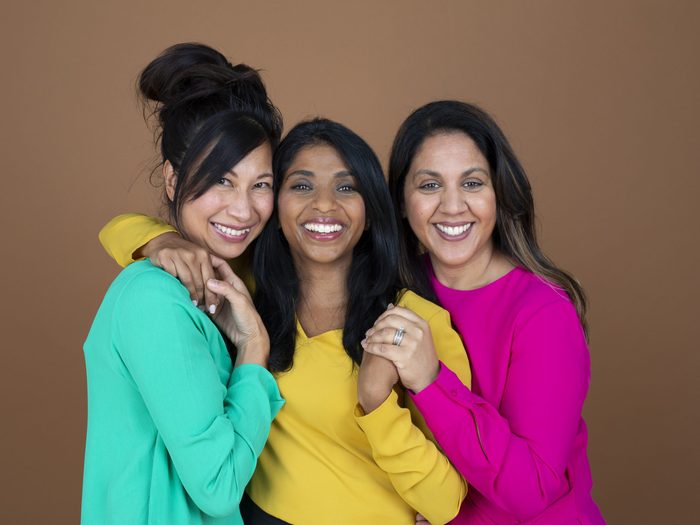
The kids are alright
Since meeting in their teens, the connection between Lisa Mattam, Shalimar Santos-Comia and Jasmine Malhotra has been strengthened by shared family values and a deep trust in one another.
The three friends have always provided good advice and unwavering support for one another—whether it be odd-hour phone calls, catching up on the sidelines of a baseball game or late-night driveway sessions once their kids are in bed.
During the pandemic, Mattam and Malhotra’s families bubbled together, which allowed them to have much-needed face-to-face hangs. “The hardest thing about the pandemic for me was not being able to see people,” says Malhotra. “I can give up restaurants and outings and travel, but to be taken away from my people was really hard.”
During that time, Santos-Comia’s brother had a recurrence of cancer, and she knew she could confide in Mattam. “[Lisa] knows what I’m going through before I even say it,” says Santos-Comia. “It meant so much because I didn’t have to articulate everything perfectly.”
They are my family, says Mattam. “It’s unconditional.”
(Related: “Don’t Try to Change Someone’s Reality”: How My New Blended Family Survived Covid Lockdown)
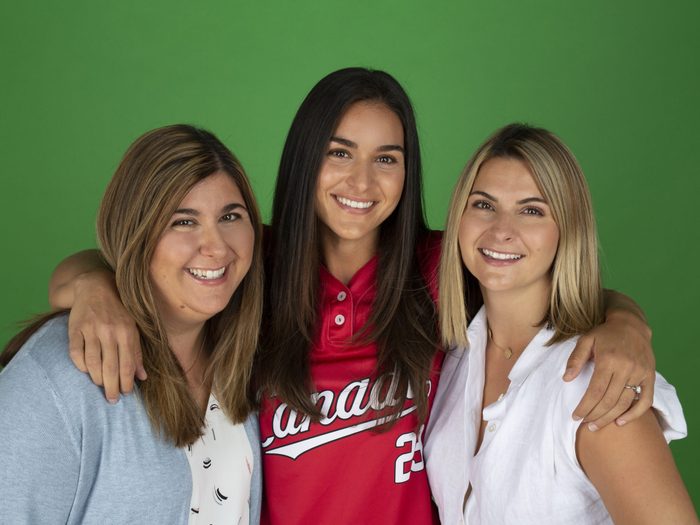
Family matters
The Caira sisters have always been close, “and the pandemic only solidified how strong our family relationship is,” says Jenna, the youngest sister and an Olympic bronze medal–winning softball pitcher. During lockdown, the family connected by doing workouts five days a week for nearly five months, all over FaceTime, with Jenna leading the circuits.
When the Tokyo Olympics were cancelled in March 2020, Jenna’s sisters provided some much-needed perspective. “Even if the Olympics didn’t happen, I knew I was going to be okay because they reminded me that I had so much more to live for than just the game,” Jenna says. The older Caira sisters fretted about negative Olympics news in their separate chat, knowing it wouldn’t be helpful to Jenna when she needed to focus on training.
The Cairas are now making up for the family gatherings they missed out on over the past 18 months. First up: Jenna’s wedding, where Danielle will be the officiant and Nadia the maid of honour.
(Related: 8 Women Share the Impact the Pandemic Has Had on Their Mental Health)
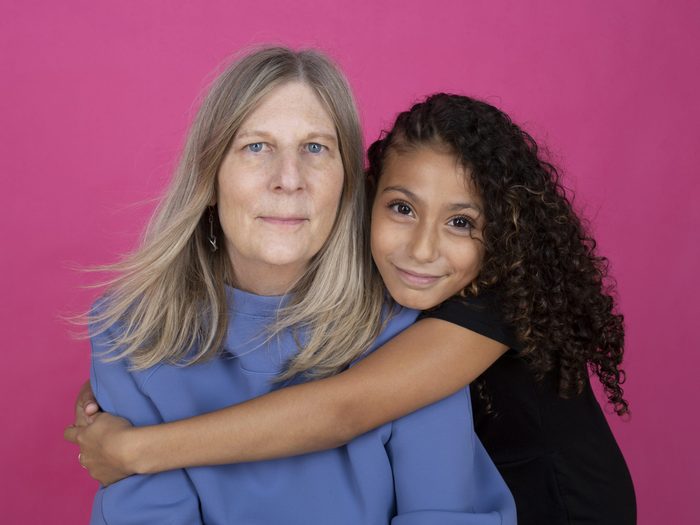
Perfect strangers
Tina Beauchamp had been waiting for years to find a match through Big Brothers Big Sisters’s Big G program, which connects folks age 55 and up with kids in their community. She finally got the call early this year to meet nine-year-old Lazzara Hines. “It was so worth the wait,” Beauchamp says.
They first met virtually in February 2021, and to break the ice, Hines taught Beauchamp how to fold a paper crane. By the end of their call, Beauchamp was blown away by Hines’s patience and how willing she was to teach her Big Sister. The two FaceTimed at least once a week all winter long, playing games, tackling homework and chatting about life. During the summer, they were finally able to meet in person and fell into a routine of going on long walks, which often ended with an ice cream cone.
While Beauchamp credits Hines for teaching her about patience, Hines thanks her Big Sister for teaching her how to come out of her shell. “I’ve always been shy, but now I know to say hi and thank you whenever someone is being nice,” Hines says. As Toronto continues to open up, the pair are excited to explore more of the city. Beauchamp plans on taking Hines to movies, parks and museums.
Next, Here are 4 Stretches to Improve Range of Motion as You Age
